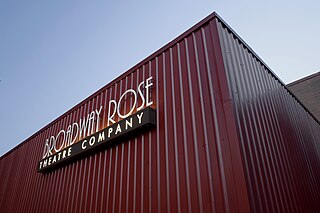
The Oregon Shakespeare Festival (OSF) is a regional repertory theatre in Ashland, Oregon, United States, founded in 1935 by Angus L. Bowmer. From late February through October each year, the Festival now offers 800 to 850 matinee and evening performances of a wide range of classic and contemporary plays not limited to Shakespeare to a total annual audience of nearly 400,000. The Festival welcomed its millionth visitor in 1971, its 10-millionth in 2001, and its 20-millionth visitor in 2015. At any given time between five and eleven plays are offered in daily rotation six days a week in its three theatres.

The Old Spaghetti Factory is an Italian-style chain restaurant in the United States and Canada. The U.S. restaurants are owned by OSF International, based in Portland, Oregon, while the Canadian restaurants are owned by The Old Spaghetti Factory Canada Ltd. In 2003, the U.S. company alone had 45 restaurants, in 14 states and Japan, and sales of $105 million. The U.S. firm also operated an Old Spaghetti Factory in Hamburg, Germany, from 1983 to 1993, but that was its only European location.
Eileen DeSandre is an American stage actor and a member of the Actors' Equity Association. Known for much of her career as a character actor in the Oregon Shakespeare Festival in Ashland, Oregon, she has in recent years taken lead roles in a variety of theaters. She has an M.F.A. in acting from Pennsylvania State University and a B.A. in French and theater from Seton Hill University.
Production history of plays performed by the Oregon Shakespeare Festival, as of May 2020.

Bill Rauch is an American theatre director. He was named the inaugural artistic director of the Ronald O. Perelman Performing Arts Center at the World Trade Center in 2016. Currently in development, the Perelman is the final piece of the plan to revitalize the World Trade Center site and will create work which inspires hope.

Lips Together, Teeth Apart is a play by American playwright Terrence McNally. The play, which premiered Off-Broadway in 1991, concerns two straight couples who spend a weekend in a gay community.

Libby Appel served as the fourth artistic director of the Oregon Shakespeare Festival (OSF) from 1995 to June 2007. Appel directed more than 25 productions at OSF, and her artistic vision influenced the 11 plays presented each year during her tenure. Despite the festival's name, she placed increased emphasis on new works. “We have made major connections with world playwrights, artists whose voices we’re particularly interested in.” Appel said. “We commission playwrights, we develop plays here; we have playwrights in residence. We’re a world force now, and I’m really proud of that.”
Stark Raving Theatre was a theatre company in Portland, Oregon that operated from 1988 to 2006. Unlike most other theatres in the country, it was dedicated to premiering new works.

The Armory, historically known as the First Regiment Armory Annex, and now called Portland Center Stage at The Armory, is a historic building with two theaters inside and is located in Portland, Oregon, United States and is home to the theater company, Portland Center Stage. It was built in 1891 by Multnomah County to house the Oregon National Guard. In 2000, it was added to the National Register of Historic Places. Following a $36.1 million renovation project that lasted from 2002 to 2006, the building home to the theater company Portland Center Stage which produces 11 productions each season. An estimated 150,000 visitors visit The Armory annually to enjoy a mix of classical, contemporary and world premiere productions, along with the annual JAW: A Playwrights Festival, and a variety of high quality education and community programs.

Portland Monthly is a monthly news and general interest magazine which covers food, politics, business, design, events and culture in Portland, Oregon. The magazine was co-founded in 2003 by siblings Nicole and Scott Vogel. Nicole had previously worked for Cendant Corporation and Time Warner, and Scott had been a journalist at The New York Times. Though the magazine had some trouble with funding in its first year, it grew to a stable circulation of 56,000 and by 2006 was the seventh-largest city magazine in the United States.

Richard L. Hay is the Principal Theatre and Scenic Director at the Oregon Shakespeare Festival.
Hillsboro Artists' Regional Theatre (HART), originally the Hillsboro Actors Repertory Theater, is a community theatre group in Hillsboro, Oregon, United States. Founded in 1994, the non-profit group presents around six plays each year. Their 99-seat theater is located in downtown Hillsboro next to the Hillsboro Civic Center along Washington Street.

ACT Theatre is a regional, non-profit theatre organization in Seattle, in the US state of Washington. Gregory A. Falls (1922–1997) founded ACT in 1965 and served as its first Artistic director; at the time ACT was founded he was also head of the Drama Department at the University of Washington. Falls was identified with the theatrical avant garde of the time, and founded ACT because he saw the Seattle Repertory Theatre as too specifically devoted to classics.

Bag & Baggage Productions is a professional theatre company based in Hillsboro, in the U.S. state of Oregon. Founded in 2005, the non-profit group presents about four productions per year. Their home venue is "The Vault", a theater located in a former bank building in downtown Hillsboro, on East Main Street.

Broadway Rose Theatre Company is a professional musical theatre company based in Tigard, Oregon. Founded in 1991, the company produces six mainstage productions, two children's musicals, and a teen workshop production each year. Their home theater is The New Stage, a 270-seat venue, with their summer season playing at Deb Fennell Auditorium, a 600-seat auditorium at Tigard High School. Broadway Rose Theatre Company is a 501(c)(3) nonprofit organization.

Imago Theatre is a theatre company based in Portland, Oregon, United States. Co-Artistic Directors, Carol Triffle and Jerry Mouawad, began collaborating in 1979 and founded Imago Theatre in 1982.

Timothy Bond is the Head of the Professional Actor Training Program and professor at the University of Washington School of Drama.
Tony Cisek is an American scenic designer.

Yussef El Guindi is an Egyptian-American playwright. He writes full-length, one-act, and adapted plays on Arab-Muslim experience in the United States. He is best known for his 2005 play Back of the Throat and has been called "the most talented Arab American writer of political plays."
Jessica Wallenfels is an American actress, choreographer, movement and theatre director, and graphic designer, notable for her early cult roles in Twin Peaks and the movie Dogfight, along with her later work as a choreographer, director, and stage actress.














